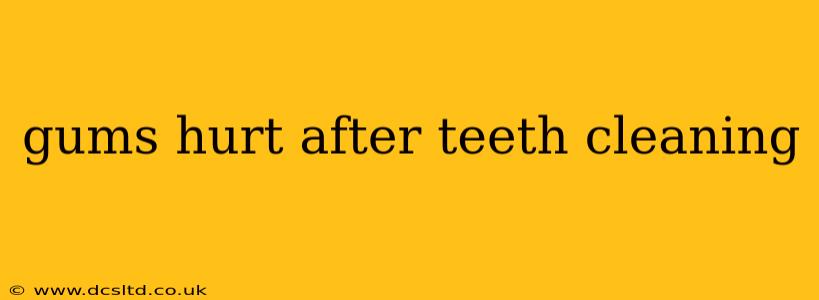Many people experience some degree of gum soreness after a professional teeth cleaning. While a little discomfort is normal, persistent or severe pain warrants attention. This comprehensive guide explores the reasons behind post-cleaning gum sensitivity, effective remedies, and preventative measures to minimize future discomfort.
Why Do My Gums Hurt After a Teeth Cleaning?
The most common reason for gum soreness after a cleaning is the removal of plaque and tartar buildup. This process, while essential for oral health, can temporarily irritate the gum tissue. The hygienist uses specialized tools that may inadvertently cause minor trauma to the gums, leading to inflammation and sensitivity.
What Causes Gum Sensitivity After a Dental Cleaning?
- Aggressive Cleaning: While unlikely with a qualified hygienist, overly vigorous cleaning can irritate the gums.
- Gum Disease (Gingivitis or Periodontitis): Existing gum disease makes gums more susceptible to inflammation and bleeding, leading to increased sensitivity after cleaning.
- Receding Gums: If your gums have receded, the tooth roots become exposed, making them sensitive to cleaning and temperature changes.
- Dry Mouth: Dry mouth reduces saliva production, which normally protects and lubricates the gums.
- Use of Ultrasonic Scalers: These devices produce vibrations that, while effective, can occasionally cause some temporary gum irritation.
How Long Does Gum Soreness After a Cleaning Last?
The duration of gum soreness varies. For most people, the discomfort subsides within 1-3 days. However, if the pain persists for longer than a week, or if it's severe, you should contact your dentist.
What Can I Do to Relieve Gum Pain After a Cleaning?
Several at-home remedies can ease post-cleaning gum discomfort:
- Saltwater Rinse: Dissolve ½ to ¾ teaspoon of salt in 8 ounces of warm water. Gently swish this solution around your mouth several times a day. The salt's antiseptic properties help soothe inflammation.
- Cold Compress: Apply a cold compress or ice pack wrapped in a thin cloth to your cheek for 15-20 minutes at a time. This can reduce swelling and numb the area.
- Over-the-Counter Pain Relievers: Ibuprofen or acetaminophen can help alleviate pain and inflammation. Follow the recommended dosage instructions.
- Gentle Brushing and Flossing: Continue your regular oral hygiene routine, but use a soft-bristled toothbrush and floss gently to avoid further irritation.
- Avoid Irritants: Steer clear of acidic foods, hot beverages, and alcohol, as these can exacerbate gum sensitivity.
How Can I Prevent Gum Soreness After Future Cleanings?
Prevention is key to minimizing discomfort. Here are some helpful tips:
- Maintain Good Oral Hygiene: Regular brushing, flossing, and rinsing with an antibacterial mouthwash can significantly reduce plaque buildup, making cleanings less traumatic.
- Inform Your Hygienist: Let your hygienist know about any existing gum sensitivity or discomfort you experience. They can adjust their technique accordingly.
- Manage Gum Disease: If you have gum disease, diligent treatment is crucial. Your dentist can provide guidance on managing the condition to prevent further complications.
Is it Normal for My Gums to Bleed After a Teeth Cleaning?
A small amount of bleeding during or immediately after a cleaning is not uncommon, especially if you have gingivitis. However, excessive bleeding is a sign that you may need more thorough treatment.
When Should I Call My Dentist After a Teeth Cleaning?
Contact your dentist if:
- Your gum soreness is severe or persistent (lasting more than a week).
- You experience significant bleeding.
- You notice any signs of infection, such as swelling, pus, or fever.
By understanding the causes of post-cleaning gum soreness and employing the suggested remedies and preventative measures, you can maintain optimal oral health and minimize discomfort during and after your dental cleanings. Remember, regular dental checkups are crucial for preventing more serious issues and ensuring a healthy smile.
